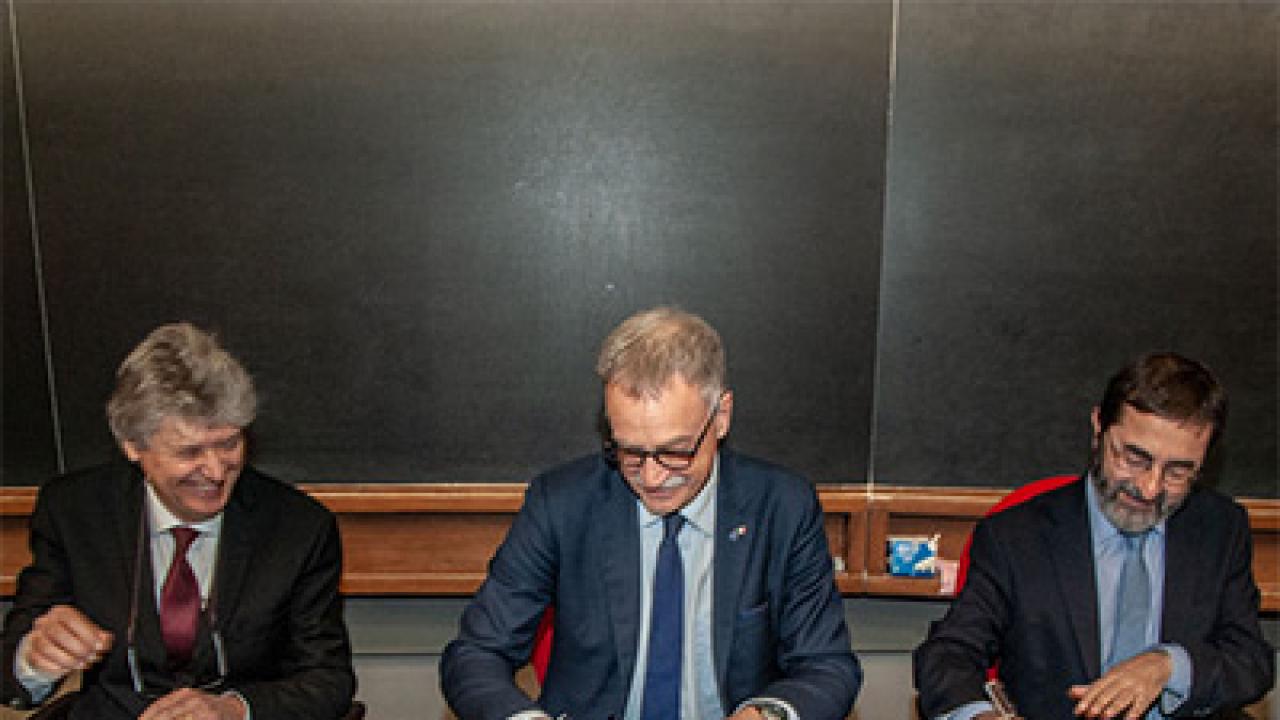
In an important, innovative development for its host city of Trieste, ICTP has joined forces with the International School for Advanced Studies (SISSA) and the University of Trieste to launch a new institute dedicated to the study of quantum technologies, which are now at the centre of a 1 billion euro funding initiative by the European Commission over the next 10 years.
The achievements of the first quantum revolution are now part of our daily lives, thanks to smartphones, lasers and imaging technologies such as magnetic resonance. However, the future promises even more powerful, secure and precise technologies, starting from cryptography. Quantum communication will allow the secure transmission of sensitive data such as health or financial records and the use of unbreakable passwords. However, this is just one example. We may have quantum computers, simulators and sensors that will not only allow us to solve problems which are currently unsolvable, but will also be key for medical diagnosis, drug design and much more.
The Trieste Institute for the Theory of Quantum Technologies (TQT) will be an international centre of research excellence, serving as a catalyst for theoretical activities not only in Italy, but also in neighbouring and developing countries. The institute, which will be located on ICTP's campus, will offer conferences and schools in the field of quantum technologies, with high-level training and expertise. The aim is to promote collaboration between Italian and foreign scholars, both junior and senior, in order to enhance interdisciplinarity and innovation and maximize international impact.
The formal inauguration took place during a ceremony on 25 March at ICTP, where the directors of the three partner institutes--ICTP's Fernando Quevedo, SISSA's Stefano Ruffo and the University of Trieste's Maurizio Fermeglia--signed the agreement. In addition to announcing the new initiative, the ceremony featured a talk by quantum computing pioneer Ignacio Cirac from the Max-Planck Institut für Quantenoptik, Germany (see the ceremony and talk recording on ICTP's YouTube page).
"The creation of the TQT reflects ICTP's intention to evolve in response to a changing world, initiating efforts where new priorities—and new potential—in science and in the developing world demand ground-breaking research," said ICTP Director Fernando Quevedo. He added, "Quantum technologies represent some of the most exciting frontiers in science today, and I am confident that our joint exploration of their possibilities with our SISSA and University of Trieste colleagues will create important advances in this quickly evolving field."
According to SISSA Director Stefano Ruffo, the creation of the TQT is a natural path, given the scientific history and value of Trieste. “The scientific community working on the theoretical investigation of quantum systems in Trieste is outstanding at both the national and international levels, because of its size and also its research excellence. Moreover, it builds on the work of local scientists, such as Giancarlo Ghirardi, who were pioneers in this field.”
Maurizio Fermeglia, rector of Trieste University, also emphasized the bond between past and future: “Trieste University –always committed to scientific and technological innovation –has been focusing on the evolution of systems for calculation, simulation, transmission and storage of data. This initiative is in line with the past and points clearly to the future, introducing a new paradigm in scientific calculation, that of exploiting the properties of quantum physics to make the computers ‘think’ n a different, non-linear way.”
Keynote speaker Ignacio Cirac, one of the world's leading experts in quantum information, said of the TQT initiative, “Quantum computing has joined forces with some other areas of science, so now it seems there is a language that is emerging, that there is a new perspective for many problems. Whenever this has happened in the past, there were scientific revolutions, so I hope that this will not only create some devices but will also advance science.”
ICTP first identified data science and computing as being critical areas for research and training in 2010, while brainstorming on the contours of its new multiyear strategic plan. The TQT will complement these activities, while providing a valuable venue for imparting cutting-edge knowledge to the thousands of scientists from developing countries who travel to ICTP each year for education and training opportunities. The Centre already has several conferences on quantum technology lined up for 2019. These include the Advanced School and Workshop on Ubiquitous Quantum Physics: the New Quantum Revolution, which was held from 18 to 22 February, and the School on Advances in Condensed Matter Physics: New Trends and Materials in Quantum Technologies, which will run from 7 to 15 May.
______________________
Photos of the ceremony are available on ICTP's Flickr page.
















